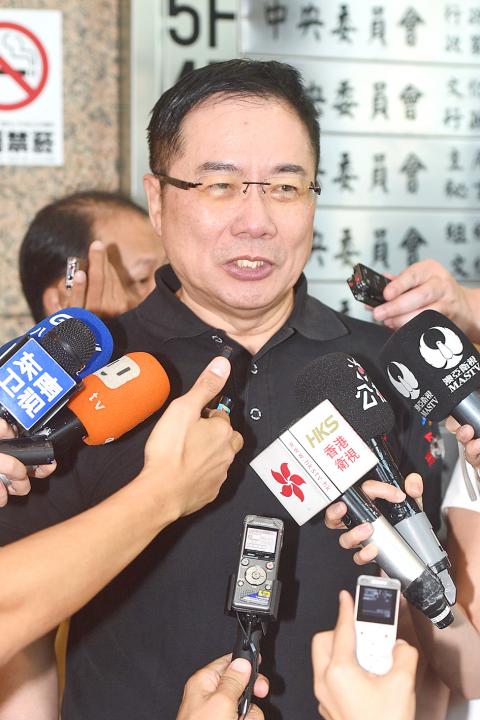Chinese Nationalist Party (KMT) Vice Chairman Hau Lung-bin (郝龍斌) yesterday urged KMT members to present a united front on the so-called “1992 consensus,” and cease the internecine conflicts that have driven a wedge between the camps of KMT Chairwoman Hung Hsiu-chu (洪秀柱) and former president Ma Ying-jeou (馬英九).
“In the past, the KMT’s cross-strait policy, which centers on adherence to the ‘1992 consensus’ and the ‘one China, with different interpretations’ framework, had only been challenged by the Democratic Progressive Party [DPP] and former president Lee Teng-hui (李登輝). Never before has it be a subject of contention within the KMT,” Hau said on Facebook.
With the approach of the Cross-Strait Peaceful Development Forum — which is scheduled to take place on Wednesday and Thursday next week in Beijing — it is critical that KMT members put forward a clear policy position and stop quarreling, the former Taipei mayor said.

Photo: George Tsorng, Taipei Times
The DPP’s difficulties over its stance on cross-strait relations demonstrate that the KMT’s cross-strait policy has been correct all along and that the “1992 consensus” and “one China, different interpretations” are vital to maintaining stable cross-strait development, Hau said.
“If even our own people reject that policy, we could lose the possibility of proving ourselves right through the failure of the DPP’s governance,” he said.
The “1992 consensus” refers to a tacit understanding between the KMT and Beijing that both sides of the Taiwan Strait acknowledge there is “one China,” with each side having its own interpretation of what “China” means. Former Mainland Affairs Council chairman Su Chi (蘇起) in 2006 said that he had made up the term in 2000.
At the center of the altercation between Hung’s and Ma’s camps is the policy platform passed by the party’s national congress early last month that aims to “further” the “1992 consensus” and explore the possibility of signing a cross-strait peace accord.
Critics have said the new platform is an attempt by Hung to move the KMT closer to the concept of “one China, same interpretation,” as it only mentions the “different interpretations” aspect of the “consensus” once in the introduction as part of the party’s history and omits the term in the latter part of the platform, which sets out the party’s main policy.
Hau said that without having a united front on the “1992 consensus” and “one China, different interpretations” the KMT would be in no position to question the DPP’s cross-strait policy or promote interactions across the Taiwan Strait.
“Also, how can we discuss a peace accord [with Beijing] if there is no consensus among Taiwanese and our position is not based on the foundation of ‘one China, different interpretations?’” Hau said.
Despite Hau’s calls for party solidarity, KMT Central Policy Committee director Alex Tsai (蔡正元) later yesterday took aim at Ma’s office, which issued a statement on Tuesday urging Tsai to study history more closely to gain a “more accurate understanding” of the content of the “1992 consensus.”
“Who is ‘Ma Ying-jeou’s office’ anyway? It published a weird news release without leaving the name of its spokesperson. It is no different from a fake Facebook account,” Tsai said on Facebook, urging the office to look at itself in the mirror before giving him directions.

The Central Weather Administration (CWA) yesterday said it expected to issue a sea warning for Typhoon Fung-Wong tomorrow, which it said would possibly make landfall near central Taiwan. As of 2am yesterday, Fung-Wong was about 1,760km southeast of Oluanpi (鵝鑾鼻), Taiwan’s southernmost point, moving west-northwest at 26kph. It is forecast to reach Luzon in the northern Philippines by tomorrow, the CWA said. After entering the South China Sea, Typhoon Fung-Wong is likely to turn northward toward Taiwan, CWA forecaster Chang Chun-yao (張峻堯) said, adding that it would likely make landfall near central Taiwan. The CWA expects to issue a land

Taiwan’s exports soared to an all-time high of US$61.8 billion last month, surging 49.7 percent from a year earlier, as the global frenzy for artificial intelligence (AI) applications and new consumer electronics powered shipments of high-tech goods, the Ministry of Finance said yesterday. It was the first time exports had exceeded the US$60 billion mark, fueled by the global boom in AI development that has significantly boosted Taiwanese companies across the international supply chain, Department of Statistics Director-General Beatrice Tsai (蔡美娜) told a media briefing. “There is a consensus among major AI players that the upcycle is still in its early stage,”

The Central Weather Administration (CWA) yesterday said it is expected to issue a sea warning for Typhoon Fung-wong this afternoon and a land warning tomorrow. As of 1pm, the storm was about 1,070km southeast of Oluanpi (鵝鑾鼻), Taiwan’s southernmost point, and was moving west-northwest at 28 to 32kph, according to CWA data. The storm had a radius of 250km, with maximum sustained winds of 173kph and gusts reaching 209kph, the CWA added. The storm is forecast to pass near Luzon in the Philippines before entering the South China Sea and potentially turning northward toward Taiwan, the CWA said. CWA forecaster Chang Chun-yao (張峻堯) said

PREPARATION: Ferry lines and flights were canceled ahead of only the second storm to hit the nation in November, while many areas canceled classes and work Authorities yesterday evacuated more than 3,000 people ahead of approaching Tropical Storm Fung-wong, which is expected to make landfall between Kaohsiung and Pingtung County this evening. Fung-wong was yesterday morning downgraded from a typhoon to a tropical storm as it approached the nation’s southwest coast, the Central Weather Administration (CWA) said, as it issued a land alert for the storm. The alert applies to residents in Tainan, Kaohsiung, Pingtung and Taitung counties, and the Hengchun Peninsula (恆春). As of press time last night, Taichung, Tainan, Kaohsiung, and Yilan, Miaoli, Changhua, Yunlin, Pingtung and Penghu counties, as well as Chiayi city and county had